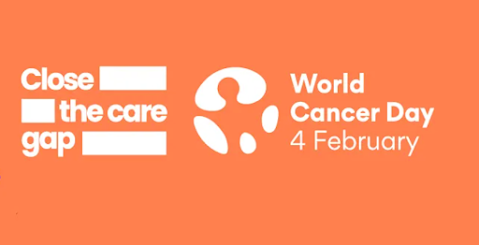FORUM: "Close the Care Gap." World Cancer Day 2024. The Day will focus on examining the socioeconomic factors that lead to disparities in cancer prevention, incidence and survival, such as cultural and gender norms, income and education levels, and biases based on age, gender, ethnicity, disability and lifestyle. Additionally, there will be a call for increased action to improve cancer awareness, prevent cancer, support advancements in diagnostics and treatment, and address the shortcomings in health systems highlighted by the COVID-19 pandemic. There will also be opportunities for interviews with WHO and partners in different regions and WHO countries worldwide. World Cancer Day aims to promote awareness on cancer as a public health issue and to strengthen actions towards improving access to quality care, screening, early detection, treatment and palliative care. This year’s theme marks the second year of the campaign “close the care gap” which is about understanding the inequities in cancer care and taking actions to make the necessary progress to address them.
EVENTS: On February 4th, for the World Cancer Day 2024 various activities will take place globally, including the "5k Challenge" by the Union for International Cancer Control (UICC), encouraging individuals from all backgrounds to participate in activities such as running, cycling, swimming, hiking or walking to symbolize closing the gap in care. Additionally, there will be "21-day challenges" for individuals to create new healthy habits, raise awareness about cervical cancer, and educate themselves about inequalities in accessing cancer services.
STATEMENTS: Read the statement of the the WHO Africa Director-General Dr. Matshidiso Moeti on World Cancer Day 2024; February 4th.
In August 2023, I attended a cervical cancer meeting with survivors and was excited by the potential of new tools to accelerate access to vaccination, screening, and treatment. One of the things survivors said was the need for leaders to listen to their stories.
On the 4th of February every year, the world unites to raise awareness on fundamental cancer issues; we at the WHO African Region connect with the public in spearheading this annual awareness day and beyond.
Between 2022 and 2024, the focus of World Cancer Day is to help “Close the cancer gap.” This year marks the third and final year of the campaign. The theme for this year is “Together, we challenge those in power”. This theme encompasses the global demand for leaders to prioritize and invest in cancer prevention and care and to do more to achieve a just and cancer-free world.
The cancer situation in Africa is disheartening. In the year 2020, approximately 1.1 million new cancer cases occurred on the continent, with around 700 000 deaths. About 50% of new cancer cases in adults in Africa are due to breast, cervical, prostate, colorectal, and liver cancers. If urgent measures are not taken, cancer mortality in the region is projected to reach about one million deaths per year by 2030. Also, in 20 years, cancer death rates in Africa will overtake the global average of 30%. This is more so because cancer survival rates in the WHO African region currently average 12%, much lower than the average of over 80% in High-Income Countries.
Nevertheless, we commend the progress made in cancer prevention and care in our region. For instance, 17 countries have introduced high-performance-based screening tests in line with the WHO recommendations. Also, 28 of our Member States have introduced nationwide HPV vaccination to reach about 60% of the priority population targeted with HPV vaccination.
This year’s theme is auspicious as it reinforces all persons and groups’ universal right to health. We believe that regardless of socioeconomic status, geographic location, age, and gender, every person must be afforded an equal chance at the prevention, diagnosis, and treatment of cancer.
We call on the region’s countries, communities, partners, and civil society to unite and foster universal access to cancer prevention and care.
Stakeholders must identify feasible priorities, implement evidence-based population-wide interventions and invest in cancer control.
Countries should use the updated WHO Best Buys , the facilitative tool designed to enable governments to select lifesaving policies and interventions for noncommunicable diseases.
Leaders are responsible for ensuring that cancer prevention and care deploy technologies and therapies that are available at low cost to affected persons and their families, which are value for money. Furthermore, countries should strengthen information systems to gather quality data for decision-making.
We reiterate that civil society, especially organizations of cancer survivors or persons with lived cancer experiences, are critical in the fight against cancer in Africa. Such a whole-of-society approach to cancer prevention and care is the essence of this year’s World Cancer Day theme.
“Together, we challenge those in power” to go the extra mile for a cancer-free Africa!
WHO Africa Director-General Dr. Matshidiso Moeti.



No comments:
Post a Comment